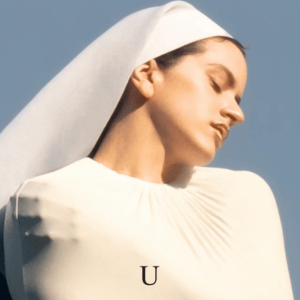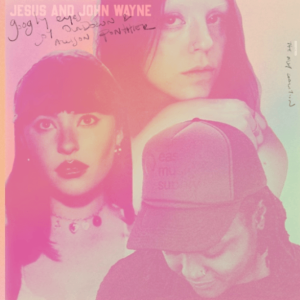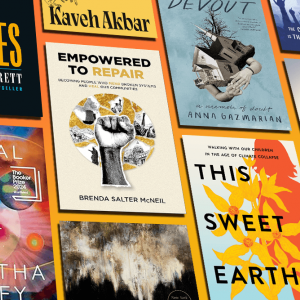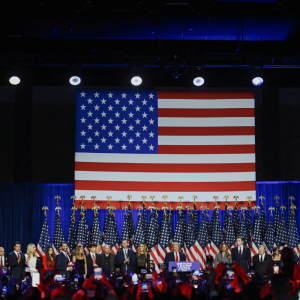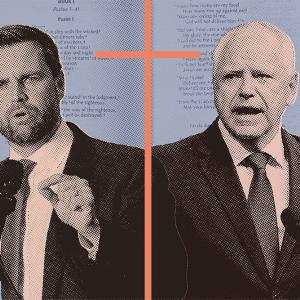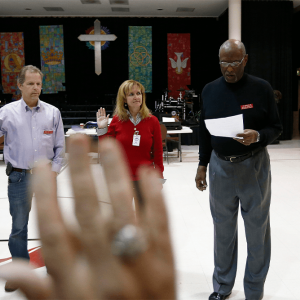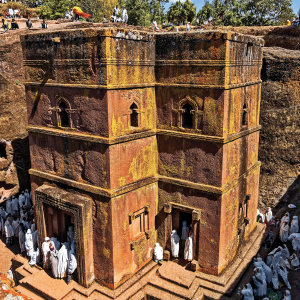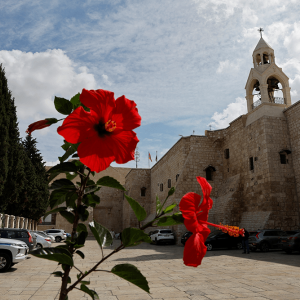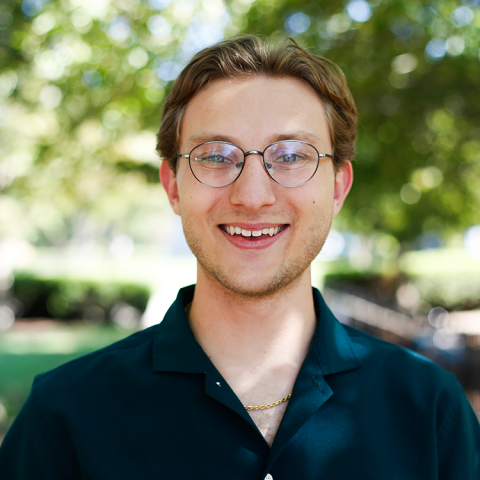
Ezra Craker grew up in Grand Rapids, Mich., and graduated from Calvin University, where he studied writing, political science, and Spanish. He was a reporter and editor at Calvin’s newspaper, Chimes, and a staff member of the campus creative journal, Dialogue. During his time in college, he also interned at the independent literary publisher Tupelo Press and the Center for Public Justice, a public policy and civic education organization.
In his free time, Ezra enjoys reading, chatting about pop culture, and spreading the gospel of the aptly named Great Lakes.
Posts By This Author
Rosalía’s ‘Lux’ Is a God-Haunted Masterpiece
On the cover art of her latest album, Lux, Spanish superstar Rosalía poses in a white nun’s habit, arms bundled to suggest straight-jacket confinement or maybe self-love. Before anyone heard a note of the new music, the internet was already bubbling over with commentary, par for the course when it comes to the complicated pop auteur. Fans and haters alike wondered what the Catholic imagery might mean. Habit aside, had Rosalía gone tradwife? Even Ikea joined in on the pre-release conversation, posting a version of the album cover with an overhead lamp. In Latin, Lux means light.
The album is a visionary landmark in pop music. Largely departing from previous forays into flamenco fusion and experimental reggaeton, Rosalía primarily draws from the classical tradition for the project, recording with the London Symphony Orchestra and pushing her voice into new operatic territory. Oh, and she sings in 13 different languages.
How Do You Cope With The Unknown?
Once, a woman told me the closest thing she had to a religion was speculative fiction. Just as spiritual practices do for many believers, reading Ursula Le Guin and Octavia Butler helped her face the haunting edge of humanity’s knowledge, those parts of being alive that refuse explanation.
It’s this confrontation with mystery that Megan Giddings places at the center of her captivating novel Meet Me at the Crossroads. Seven doors appear around the world, each opening to a beautifully warped alternative dimension. Those who walk through these doors see meadows peppered with gold stones and orange deserts under purple skies — but they don’t always come back. Once people realize that the doors are “uncontrollable, unkillable and unknowable,” most ignore them or call them a hoax, aside from a few fringe religious groups. Woven with plenty of heart, this story is not so much about the nature of the unknown as the complicated ways people cope with it.
In Michigan, twins Ayanna and Olivia grow up near one of the doors, developing contrasting ideas of its meaning. Ayanna lives with their father, who raises her in a marginalized faith community that reveres the door as a divine invitation to embrace mystery. Olivia lives with their mother, a Catholic who rejects her ex-husband’s religion as heretical. Amid the tense family dynamics, the sisters remain close until, upon entering the door as teenagers, Olivia disappears.
The ‘Jesus and John Wayne’ Soundtrack You Didn’t Know You Needed
Released five years ago, Kristin Kobes Du Mez’s Jesus and John Wayne: How White Evangelicals Corrupted a Faith and Fractured a Nation is no orindary history book. Since it published, the treatise on militant Christian masculinity has shaped conversations about Trumpism in both Christian and secular spaces. A surprise New York Times bestseller, the book resonated with many readers who found that it clarified their own experiences of growing up in the American evangelical subculture — and it drew criticism from others who found it to be an unfair takedown of conservative Christianity.
Now, it has a theme song.
Sojourners’ Top Books of 2024
Perhaps more than any other medium, books can simultaneously sharpen our suspicion and enlarge our imaginations. Sojourners’ best books of 2024 do both with style.
What We Know About Religion and Policy in a Donald Trump White House
President-elect Trump, according to the Associated Press, has won the White House. He won the election in part by courting conservative religious communities — and appealing to their anxieties — on the campaign trail. His policy agenda will likely be shaped by these groups, influencing the White House on a range of issues from education to reproductive rights.
A Deep South Jeremiad Shows Why Living Prophets Aren’t Easily Marketable
Jamie Quatro’s ‘Two-Step Devil’ is a theological thought experiment.
THE WORD “PROPHETIC” gets thrown around a lot in Christian circles. The adjective carries both an ancient heft and a forward-looking fire, the perfect jolt of biblical energy for the nouns that need it: a prophetic book, a prophetic sermon, a prophetic Instagram infographic. But living prophets, especially the self-anointed ones, aren’t so easily marketable. They’re stubborn and strange, somehow arrogant enough to believe they speak for an invisible God who turns out to be, more often than not, extremely angry at large swaths of humanity.
Two-Step Devil, the second novel of rising literary voice Jamie Quatro, places one such character in the contemporary South. Known simply as The Prophet, Quatro’s lonesome protagonist lives in the kudzu-entangled backwoods of northeastern Alabama, where he paints visions of impending holy war on junkyard scraps. He’s the kind of person who can “walk around behind the world’s curtain” — glimpse the spiritual stakes behind the drudgery of familiar, if fragile, social conditions. After rescuing a teenage girl from a sex-trafficking scheme, he’s confident he’s found the one who will deliver his apocalyptic message to the White House. While he’s frail and tormented by self-doubt, she’s young and, in his eyes, innocent. Meanwhile, the girl, Michael, must pull off an urgent mission of her own.
The Faith Backgrounds of VP Candidates JD Vance and Tim Walz
As Republican Ohio Senator JD Vance and his Democratic opponent, Minnesota Governor Tim Walz, compete for the vice presidency ahead of the November election, they bring distinct religious backgrounds — and distinct approaches to the role of faith in public life.
Why More Christians Should Volunteer to Work Elections
It goes without saying that we’ve got plenty of dread to spare this year. Since President Joe Biden won the presidency in 2020, former President Donald Trump and his allies have falsely claimed that the election was rigged. Millions of Americans agree. Meanwhile, many other Americans fear how far Trump could take his authoritarian impulses in a second term. As our political culture becomes more tightly wound, the nuts and bolts of our democracy seem to be coming loose. For the average citizen, it can be hard to verify every claim we see circulated in partisan media or online. Despite election law being clear that a party can choose its nominee at convention, for example, many Republicans claimed it was “too late” for Biden to step down from his reelection campaign.
What Good Is It To See the Whole World but Forfeit Our Souls?
Tackling ethical travel in a fraught tourism industry.
COMPLETELY BY COINCIDENCE, travel writer and translator Shahnaz Habib once joined thousands of pilgrims in Lalibela, Ethiopia. Habib’s trip happened to overlap with Ethiopian Christmas, which brings Ethiopian Orthodox Christians from across the country and world to the town, famous for its medieval rock-hewn churches.
Detailing her experience in her book Airplane Mode, a personal history of travel with a sharp eye for the colonial legacies in tourism, Habib calls Lalibela’s churches “marvels of subterranean engineering.” Carved from red volcanic rock, they sit embedded in the ground, connected by tunnels. The complex of structures was built in the 12th century as an homage to Jerusalem, complete with replicas of Christ’s Nativity crib and tomb.
Habib observed as her fellow travelers lined up around the churches to kiss crosses offered by priests: “A kiss at the top of the cross, a kiss at the bottom, a touch of the cross to the forehead. Hundreds of kisses every hour.” She noted the procedural quality of the ritual.
“To lose oneself in a crowd. To walk the beaten path. To wait and be bored,” she writes. “Perhaps what separates the tourist and the pilgrim is not the reasons for their travel but the satisfaction that the pilgrim finds in what frustrates the tourist.”
‘Orbital’ Offers a God’s-Eye View of Our Fragile Home
Samantha Harvey’s new novel asks us to appreciate the paradox of our mighty and vulnerable planet.
IN ONE OF her visions, the 14th-century mystic Julian of Norwich saw all of creation in the palm of her hand. She observed that it was round as a ball and small as a hazelnut. “I marvelled how it might last,” she wrote, “for methought it might suddenly have fallen to naught for little[ness].” In other words, she thought it might vanish for being so small.
This is the feeling that pervades Samantha Harvey’s lyrical novel Orbital, which follows six astronauts as they circle the Earth and conduct scientific research. Hailing from various countries, they experience together a God’s-eye view of the planet they left behind. Continents roll past, political borders disappear, and a sense of urgency emerges. In a way only astronauts can, they absorb the simultaneous vitality and fragility of their collective home and reckon with the human-caused calamities that threaten it.
‘Dune: Part Two’ Unmasks the Danger of Prophecies
Though Paul might be a Christ, an “anointed one,” he’s no Jesus. His road does not lead to a Roman cross. Instead of forfeiting power, he’s supposed to accumulate it.
Sojourners’ Top Movies and TV Shows of 2023
At their strongest, films and TV shows can help us pay attention to — and by extension, love — the people and the world around us.
Christmas Is Canceled in Bethlehem, Say Palestinian Christians
At a vigil for peace in Washington, D.C., this Tuesday, Palestinian Lutheran pastor Munther Isaac spoke about the approaching Christmas season in his home of Bethlehem in the West Bank.
“How can we celebrate when we feel this war — this genocide — that is taking place could resume at any moment?” he said.
The Queer, Christian Yearning of Sufjan Stevens
It’s clear why fans created the once popular but now defunct Facebook page,“Is This Sufjan Stevens Song Gay Or Just About God?” But Stevens’ music has never been either gay or about God. It’s indivisibly gay and about God.
